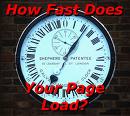Google wants faster websites
 It’s official. Google is incorporating page speed as a factor into it’s page ranking system. Any reason to panic?
It’s official. Google is incorporating page speed as a factor into it’s page ranking system. Any reason to panic?
Well Matt Cutts seems to be totally calm and cool about all the fuss with page speed becoming a Google page rank factor. He thoroughly explained in his blog about it’s effects and the changes that will happen in it’s implementation.
I don’t know if it’s true but he claims that less than 1 percent of search queries will change as a result of incorporating site loading speed into Google’s page ranking system. That’s a pretty low number if you ask me. So low, that I won’t even be bothered about this change if this much is true.
And it seems as if Matt is telling us the whole truth – because they claimed to have already launched it weeks back and I didn’t notice anything in my search queries as an SEO specialist.
Matt also explained why the ‘big-shots’ or big companies who can afford better and faster hosting are not gonna benefit from this as much as all the other small-fry bloggers out there (that includes me). Because small sites often respond faster than large companies to changes in the web. And a little tweaking in your site can boost your site speed big-time.
Matt summarized this change in three main points:
“First, this is actually a relatively small-impact change, so you don’t need to panic.
Second, speeding up your website is a great thing to do in general. Visitors to your site will be happier (and might convert more or use your site more), and a faster web will be better for all.
Third, this change highlights that there are very constructive things that can directly improve your website’s user experience. Instead of wasting time on keyword meta tags, you can focus on some very easy, straightforward, small steps that can really improve how users perceive your site.”
Tips for Keeps:
Work on your site and reduce all of the unnecessary media that can slow down your page loading speed if you want to be on top of the site-speed race.